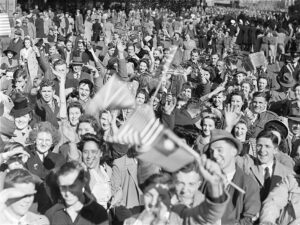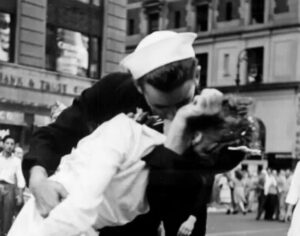1945: VE Day
May 8, 2024
By AHNZ

Today in history, 8 May, 1945, the New Zealand public started celebrating Victory Over Europe Day (VE Day.) World War 2, apart from a few more loose ends in the Pacific War, was now over. Our celebrations began without permission from the Labour 1.0 Government who insisted we wait until 1am the following day to respond to the ‘German Instrument of Surrender’ which by then would be 36 hours old. The Ministry wanted the glory of telling us how to feel or at least when we were permitted to express our feelings. The Wanganui Herald reported that this was “celebration by regulation.”¹
Acting PM Walter Nash insisted over the radio that it was not VE Day at all even though it plainly was and we knew it. No. It would be a working day as per usual and Victory would be when Nash said it was which would be the following day and involve sirens and bells and a word from the Governor General. “Work today and play tomorrow,” Nash said. Such vanity and conceit on the part of our Government is situation: normal. However, Kiwis were ambivalent about what to do now. Should they trust their own lying eyes and hearts and be glad? Or, must they repress what they knew and felt until their Government issued official permission to smile and cheer?
So, thanks to the Government, a well deserved catharsis at all the loss and suffering and trauma was blunted.
Some worshiped Dionysus and tried to make joy while others worshiped Apollo and remained restrained. The edict from Wellington made us schizoid when we ought to have come together.
Moon (2013) recorded a muffled celebration in the capital: “Wellingtonians who went to the city’s centre ‘stood around waiting for something to happen or walked up and down the streets in similar expectancy.” In Auckland the day was anti-climactic and non-spontanious. Some made an effort to dance and sing but the energy was absorbed by passive crowds. Mostly people who were out on the streets where milling about to see if something was gong to happen but of course, by edict from The Top, nothing could.
Pockets of the more Dionysian Kiwis ignored Nash’s edict to instead wave flags and have late night street parties, giving themselves the day off work. It must have seemed very unfair to those who wished to remain conformist for the sake of survival that a new era of peace was a free-for-all for whoever wanted it at the expense of those who remained disciplined. It showed the face of 2 New Zealand psycho-classes.
 According to King (1988) “pandemonium reigned in the bars.” His sources tell him that New Zealanders were making a rare break with self-restraint to go crazy in public. Moon (2013) thinks this history of VE day is corrupted. Which historian was correct?
According to King (1988) “pandemonium reigned in the bars.” His sources tell him that New Zealanders were making a rare break with self-restraint to go crazy in public. Moon (2013) thinks this history of VE day is corrupted. Which historian was correct?
Moon is correct to point out the powerful effect of good memories enduring but bad memories fading away. It’s also evidently true that Labour 1.0 and their media machine had great designs to frame VE Day their own way and on their own schedule. By Statist History of New Zealand and the newspaper clippings and photos re-produced in books like King’s the day was a great smash. A photo-finish iconic moment just like the famous sailor kissing the nurse on VJ Day later that year in New York (image, right.)
However, we shouldn’t take this mainstream received history for granted. Michael King appears to be repeating a government line whereas Moon is checking the evidence with a more skeptical eye. He wrote, “In New Zealand, the conventional stuffiness of the nation was supposedly set aside as a tidal wave of jubilance and relief washed over the nation. One of the lasting images of the victory celebrations throughout the Empire is of crowds of returned soldiers dancing with their sweethearts in streamer-strewn streets, unable to remove the smiles on their faces that expressed all that was good about the end of the biggest and in many ways the most grotesque war in history. The official reaction in New Zealand to the victory over Germany was, however, almost as much contrived as it was euphoric — window-dressing to give a show of elation…” ibid
King, on the other hand, is on-message with Government History. He even says that VE day and the “emotional explosion” was announced by the morning papers of 9 May. Nash would be very happy with Mr King…
“It cannot be said that the celebrations on VE Day added to the reputation of the city. The brief service of thanksgiving over, the Auckland crowds were left to their own devices. After their habit, they flowed down the city’s main street, a trifle bewildered and with little aim or purpose. The attempts of more sanguine spirits to rouse community singing broke on Auckland’s traditional self-consciousness. Processions, begun by youthful enthusiasts, lost cohesion in passive crowds. A little ashamed of the carpet of brown glass, Auckland drifted home, and the celebration was over.” – Moon (2013)
“It is the most iconic photograph in American History – perhaps in all history. Why? Because when people look at this picture – V-J Day 1945, In Times Square – they understand what it felt like when World War II ended.” – The Kissing Sailor: Being There in Times Square, V-J Day, 1945, defensemedianetwork.com
“On 9 May 1945, however, when the morning papers announced the end of the war in Europe, the news generated an explosion of emotions: exaltation at the Allied victory, relief at the end of insecurity, anticipation that men abroad would soon be brought home and that austerity measures would end. Normally reserved citizens…sand and danced, shouted and stamped,…” – King (1988)
“…victory, with all its brilliant trappings, appears to our strained, experienced eyes as deliverance rather than as triumph. Our hearts go out in thankfulness that we have been saved from annihilation and from the enduring ruin of our country.” – Winston Churchill (March 1945)
The official narrative that New Zealanders all responded the same way is how conformity is enforced and consent manufactured. The idea that we were all emotional and joyful creates a picture that we were all of one mind, all joint participants in the war effort with the same end in mind and glad when we had achieved it. Perhaps it was a bit more like being forced to clap in school assembly or participate by force on school athletics day. Some of us, many, were not really glad to be there at all and simply had no choice. However, the school newsletter and headmaster’s speech will reflect the narrative that everyone worked hard, had fun, and celebrated the school’s victories. Any photographic evidence for a school magazine or newspaper will only show positive things that the headmaster has vetted for the sake of the reputation of himself and his staff.
World War 2 was just a grown-up version of that high school mentality but instead of Detention or Suspension a deviant citizen was jailed a while or sent to an internment camp!
The privations were not over, especially for Britain as Winston Churchill reminded his country. New Zealand, on the other hand did very well out of the new trade order.
Not long after VE Day came VJ Day (15 August) after Japan re-confirmed the surrender they had already made once. US President Harry Truman, not taking “yes” for an answer nuked Japan a couple of times and then put the question again. The answer was still “Yes.”
—
1 Ref. New Zealand in the Twentieth Century, Paul Moon (2013)
Ref. After The War, Michael King (1988)
Image ref. VE or VJ Day. New Zealand Herald, Auckland Libraries Heritage Collections
 Like Comment Share
Like Comment Share





